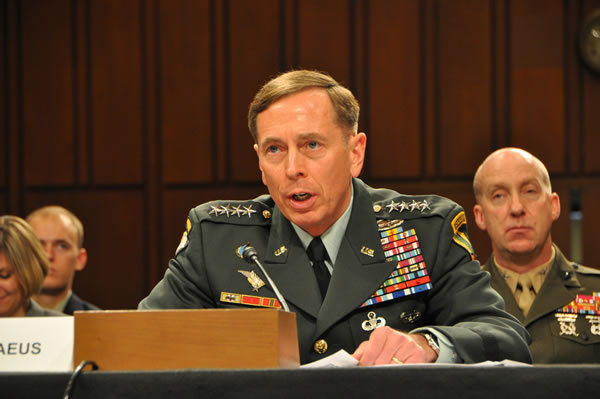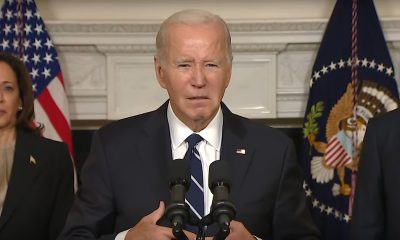National
Could Pentagon’s ‘Don’t Ask’ review hinder repeal?
Petraeus suggests outcome ‘could go in either direction’

As the top U.S. commander overseeing operations in Iraq and Afghanistan expressed support Tuesday for reconsidering “Don’t Ask, Don’t Tell,” he noted the Pentagon study currently underway could offer a positive or negative take on open service.
Following his initial remarks on “Don’t Ask, Don’t Tell,” Gen. David Petraeus, commander of U.S. Central Command, made the remarks to the Senate Armed Services Committee on the possible outcome of the study.
Chairman Carl Levin (D-Mich.) asked Petraeus to confirm he said earlier in Levin’s office that the study could show repeal’s “likely effects could go in either direction.”
“I believe you told me — either negative or positive, the study could show,” Levin said.
Petraeus affirmed that he made those remarks, saying, “It could. It could. Yes, sir.”
Asked by DC Agenda to clarify this view of the study, Levin replied, “Yeah, in terms like the impact on recruitment, readiness — it could have a positive or negative — and that’s what he confirmed here.”
Petraeus didn’t talk to reporters after the hearing.
If the parameters of the study are to determine whether repeal would have a positive or negative impact — as opposed to examining the best way to implement repeal — it would be inconsistent with how Defense Secretary Robert Gates outlined the review in congressional testimony last month. At the time, Gates said the study would focus on implementing repeal and not whether it would be beneficial or harmful to the military.
“The question before us is not whether the military prepares to make this change, but how we best prepare for it,” he said. “We received our orders from the commander-in-chief and we are moving out accordingly.”
The nature of the study as described by Petraeus and Levin also raises questions about why President Obama, who campaigned on repeal of “Don’t Ask, Don’t Tell,” would authorize a review that could complicate repeal efforts.
But Kevin Nix, spokesperson for the Servicemembers Legal Defense Network, said he’s “confident” the working group will follow the directive outlined by Gates “to figure out how best to implement open service.”
“The Senate repeal bill gives the military plenty of additional time — well into 2011 — to look at how to transition while Congress moves to end the law in 2010,” Nix said.
Nathaniel Frank, author of “Unfriendly Fire” and research fellow for the Palm Center, a think-tank on gays in the military at the University of California, Santa Barbara, said the problem with the working group is that it could succumb to what he called “political expediency.”
Frank said “mounds of research” have already answered questions about the impact on open service in the military. If the group does its job well, Frank noted, the findings will be consistent with this research and discover “there will be no negative impact or that any impact will be negligible and manageable.”
“But if the group falls prey to political pressure to exaggerate the risks to readiness, that will be used by obstructionists to derail reform in Congress, and ultimately full repeal is up to Congress,” Frank said.
Although the study was outlined as a way to implement repeal, Frank said what Gates actually put in place was a “political process,” and Obama’s willingness to set it up “does raise concerns about a repeat of the failures of 1993.”
Whatever the focus of the study, Petraeus backed the review Tuesday during the hearing as the best way to approach “Don’t Ask, Don’t Tell” while saying the time has come to “consider a change.”
“I believe the time has come to consider a change to ‘Don’t Ask, Don’t Tell,’ but I think it should be done in a thoughtful and deliberative manner,” he said. “And that should include the conduct of the review that Secretary Gates had directed that would consider the views of the force by changing the policy.”
Petraeus initially asked for eight minutes to give a statement on “Don’t Ask, Don’t Tell” in response to a question from Sen. John McCain (R-Ariz.), but Levin denied him that opportunity, saying giving the general eight minutes would violate the rules by going over the time McCain was allotted for questioning.
Levin said another senator could devote their entire question-and-answer time for Petraeus so he could offer his longer statement, although no committee panel volunteered their time. At the end of the hearing, Levin said he would welcome the longer statement from Petraeus if he wanted to submit it as part of the record.
In response to Petraeus’ remarks, Nix said SLDN is awaiting the general’s eight-minute answer before weighing in on Petraeus’ position.
“We agree that open service is more than a sound byte,” Nix said. “The bottom line is our service members are professionals and they know how to bring about the change to open service.”
U.S. Supreme Court
Concern over marriage equality in US grows two decades after first Mass. same-sex weddings
Gay and lesbian couples began to marry in Bay State in 2004

Two decades after Massachusetts became the first state to legalize same-sex marriage, a new study reveals both significant progress and ongoing challenges for married LGBTQ couples in the U.S., with a growing sense of insecurity about the future of their rights.
The Williams Institute at UCLA School of Law surveyed 484 married same-sex couples from all 50 states and D.C. The study, released Monday, marks the 20th anniversary of legal same-sex marriage in the U.S.
Researchers found that 93 percent of respondents cited love as a primary reason for marrying, with 75 percent also mentioning legal protections. Over 83 percent reported positive changes in their sense of security, and 74.6 percent noted improved life satisfaction since marrying.
However, the study also highlighted persistent discrimination and growing concerns about the future. About 11 percent of couples who had a wedding reported facing prejudice during the planning process.
Alarmingly, nearly 80 percent of respondents expressed concern about the potential overturning of the 2015 Obergefell v. Hodges decision, which legalized same-sex marriage nationwide. This anxiety has been exacerbated by initiatives like Project 2025, a conservative policy blueprint that some fear could roll back LGBTQ rights if implemented.
The possibility of a former President Donald Trump victory in the upcoming election has further intensified these concerns. Many respondents cited Trump’s previous U.S. Supreme Court appointments and his statements on LGBTQ issues as reasons for their apprehension. One participant stated, “The thought of another Trump presidency keeps me up at night. We’ve come so far, but it feels like our rights could be stripped away at any moment.”
The current political climate has 29 percent of respondents considering moving to another state, with 52.9 percent citing socio-political concerns as a primary reason. This reflects a growing sense of insecurity among LGBTQ couples about their rights and freedoms.
Brad Sears, founding executive director of the Williams Institute, noted, “The data clearly show that marriage equality has had a profound positive impact on same-sex couples and their families. However, it also reveals ongoing challenges and serious concerns about the future of these rights in light of current political trends and the upcoming election.”
Christy Mallory, legal director at the Williams Institute and lead author of the study, added, “This research provides crucial insights into the lived experiences of same-sex couples two decades after marriage equality began in the U.S. The high level of concern about potential loss of rights underscores the continued importance of legal protections and public support for LGBTQ+ equality.”
The study found that 30 percent of surveyed couples have children, with 58.1 percent of those parents reporting that marriage provided more stability for their families. However, many of these families now worry about the security of their legal status in the face of potential policy changes and shifting political landscapes.
As the nation reflects on two decades of marriage equality, the study underscores both the transformative power of legal recognition and the ongoing need for vigilance in protecting LGBTQ+ rights. The findings highlight the complex reality faced by same-sex couples in America today: Celebrating hard-won progress while grappling with uncertainty about the future, particularly in light of upcoming political events and potential shifts in leadership.
State Department
State Department hosts meeting on LGBTQ rights and foreign policy
Event took place before Pride Month reception

Secretary of State Antony Blinken on Thursday hosted a group of LGBTQ activists and politicians from around the world at the State Department.
The event — described as a “Convening on U.S. Foreign Policy: National Security, Inclusive Development, and the Human Rights of LGBTQI+ Persons” — took place before the State Department’s annual Pride Month reception. Participants included:
• Jessica Stern, the special U.S. envoy for the promotion of LGBTQ and intersex rights
• U.S. Ambassador to the U.N. Linda Thomas-Greenfield
• U.S. Trade Representative Katherine Tai
• U.S. Ambassador to India Eric Garcetti
• Suzanne Goldberg, senior advisor to the Under Secretary of State for Civil Security, Democracy, and Human Rights
• Under Secretary of State for Civilian Security, Democracy, and Human Rights Uzra Zeya
• U.S. Agency for International Development Senior LGBTQI+ Coordinator Jay Gilliam
• USAID Counselor Clinton D. White
• National Security Council Senior Director for Democracy and Human Rights Kelly Razzouk
• Assistant U.S. Secretary of Health Adm. Rachel Levine
• National Security Council Human Rights Director Jess Huber
• U.N. Assistant Secretary General for Human Rights Ilze Brandt Kehris
• Icelandic Ambassador to the U.S. Bergdís Ellertsdóttir
• Council for Global Equality Co-Executive Director Mark Bromley
• Outright International Senior Advisor for Global Intersex Rights Kimberly Zieselman
• Essy Adhiambo, executive director of the Institute for Equality and Non Discrimination in Kenya
• Pau González, co-chair of Hombres Trans Panamá and PFLAG-Panamá
“Forty-five years ago, thousands gathered in D.C. in what became the first national march for LGBTQI+, demanding their voices be heard,” said Thomas-Greenfield in a post to her X account that showed her speaking at the event. “We must continue to carry forward the spirit of these pioneers and fight for equal rights and dignity for all.”
Forty-five years ago, thousands gathered in DC in what became the first national march for LGBTQI+, demanding their voices be heard.
We must continue to carry forward the spirit of these pioneers and fight for equal rights and dignity for all. 🏳️🌈🏳️⚧️ pic.twitter.com/oph2Ahmfhq
— Ambassador Linda Thomas-Greenfield (@USAmbUN) June 28, 2024
President Joe Biden in 2021 signed a memo that committed the U.S. to promoting LGBTQ and intersex rights abroad as part of his administration’s overall foreign policy.
“LGBTQI+ rights are human rights,” said Blinken. “Our government has a responsibility to defend them, to promote them — here and everywhere.”
Blinken noted consensual same-sex sexual relations remain criminalized in 64 countries, with the death penalty in 11 of them.
He specifically highlighted Uganda’s Anti-Homosexuality Act and Hungarian Prime Minister Viktor Orbán’s government’s “smearing scapegoating, stigmatizing LGBTQI+ persons — vilifying them with degrading labels, denying them equal rights, normalizing violence against them.” (Gay U.S. Ambassador to Hungary David Pressman this month marched in the annual Budapest Pride parade.)
Blinken noted Iraqi MPs earlier this year “passed legislation that punishes same-sex relations with up to 15 years in prison.” He also pointed out that Indonesian lawmakers approved a new criminal code banning extramarital sex.
“In a nation where same-sex couples cannot marry, these laws effectively make all same-sex conduct illegal and they undermine privacy for all Indonesians,” said Blinken.
“We’re defending and promoting LGBTQI+ rights around the world,” he said.
Blinken noted seven countries — Barbados, St. Kitts and Nevis, Antigua and Barbuda, Dominica, Namibia, Singapore, the Cook Islands — have decriminalized consensual same-sex sexual relations over the last two years. He also highlighted Greece, Liechtenstein, and Thailand this year extended marriage rights to same-sex couples, and other countries are banning so-called “conversion therapy.”
“These achievements are possible because of incredibly courageous human rights defenders and government partners on the ground, but I believe America’s support is indispensable,” said Blinken. “When we engage — sometimes publicly, sometimes privately, sometimes both — when we share our own knowledge and experience, we can and we do achieve change.”
Blinken also announced the U.S. now considers sexual orientation and gender identity are part of the International Covenant on Civil and Political Rights that took effect in 1976.
“This is one of the key treaties committing nations to upholding universal rights,” he said.
“In our regular reporting to the council on human rights, we will continue to include incidents of discrimination or abuse committed against LGBTQI+ persons, now with the clear framework of this well-supported interpretation,” added Blinken. “That will further empower our efforts.”
Blinken reiterated this point and the Biden-Harris administration’s commitment to the promotion of LGBTQ and intersex rights abroad when he spoke at the State Department’s Pride Month event.
“Defending, promoting LGBTQI+ rights globally is the right thing to do, but beyond that, it’s the smart and necessary thing to do for our country, for our national security, for our well-being,” he said.
The White House
Jill and Ashley Biden headline White House Pride celebration
First lady celebrated historic pardons of LGBTQ veterans

First lady Jill Biden and the president and first lady’s daughter, Ashley Biden, headlined the White House Pride celebration on the South Lawn on Wednesday, followed by a performance by singer and actress Deborah Cox.
“My dad has built the most pro-equality administration” in history, Ashley Biden said, crediting the work of LGBTQ people of color like Marsha P. Johnson, a prominent figure in the Stonewall uprising of 1969, as well as “so many of you [who] have continued to lead their fearless fighting against against injustice here and around the world.”
She introduced her mother as “the woman who taught me to be myself up showed me in so many ways how I can make a difference” and who “works every single day, tirelessly, to ensure that all people have the opportunities and freedoms that they deserve.”
“I hope that all of you feel that freedom and love on the South Lawn today,” Jill Biden said.
Her remarks were briefly interrupted by a protestor’s chants of “no Pride in genocide,” which was drowned out by chants of “four more years.”
The first lady noted how many of the attendees came “here from states that are passing laws targeting LGBTQ Americans.”
“There are those who see our communities and our families and wish to tear them down,” she said, “those who can’t see that the world is so much bigger and [more] beautiful than they know — but when our homes are threatened, when they strip away our rights, and deny our basic humanity, we say, ‘not on our watch.'”
“Pride is a celebration, but it is also a declaration,” the first lady said, highlighting the U.S. Supreme Court’s ruling in Obergefell v. Hodges nine years ago, which established marriage equality as the law of the land.
She then credited the accomplishments of the Biden-Harris administration on matters of LGBTQ rights, including the repeal of the previous administration’s ban on military service by transgender servicemembers and the FDA’s loosening of restrictions on blood donation by gay and bisexual men.
The first lady also celebrated the president’s announcement earlier on Wednesday that he will pardon LGBTQ veterans who were discharged and court martialed because of their sexual orientation or gender identity.
“We will never stop fighting for this community,” she said.

-

 Canada1 day ago
Canada1 day agoToronto Pride parade cancelled after pro-Palestinian protesters disrupt it
-

 Theater5 days ago
Theater5 days agoStephen Mark Lukas makes sublime turn in ‘Funny Girl’
-

 Baltimore4 days ago
Baltimore4 days agoDespite record crowds, Baltimore Pride’s LGBTQ critics say organizers dropped the ball
-

 Sports4 days ago
Sports4 days agoHaters troll official Olympics Instagram for celebrating gay athlete and boyfriend












